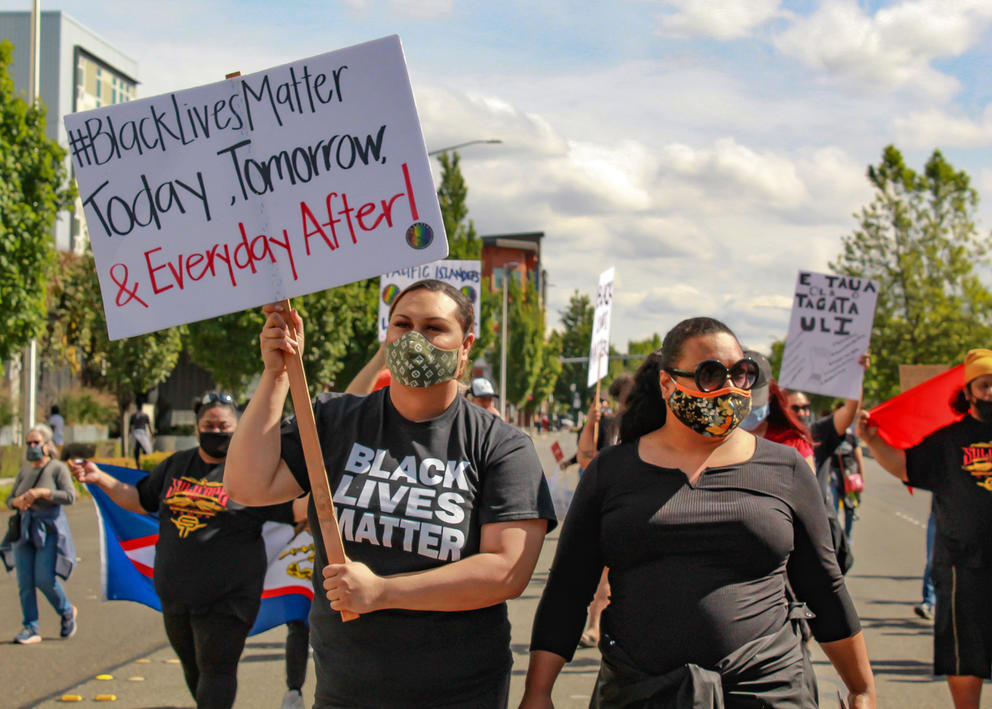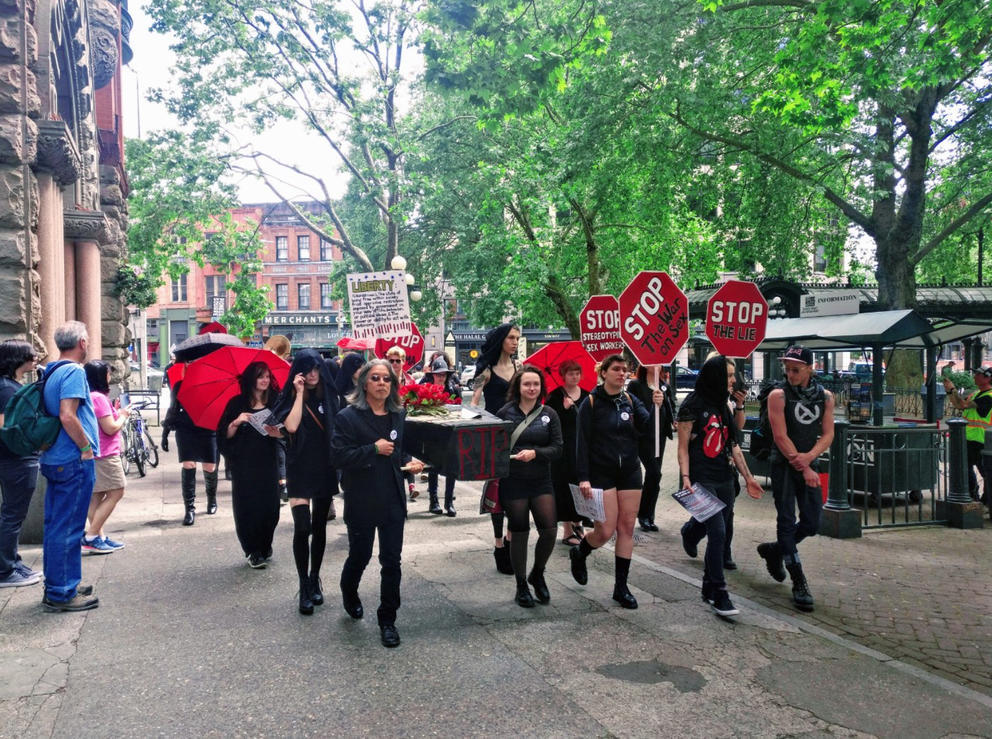Still, it was steady work. While much of Gold Buffalo’s finances has come from its work as an organizer with the Black Trans Task Force, sex work was a key supplement. Gold Buffalo’s year hinged on paid go-go dancing gigs it annually lined up throughout Pride month, as well as money made for adult videos. Besides that, with so many others like Gold Buffalo in the sex working industry, too, it was a way of finding friends and community.
“We help each other survive,” Gold Buffalo says. “We all take care of each other.”
Those plans, once so reliable, seem like ancient history now. Most in-person events Gold Buffalo was set to work at were canceled months ago, once the coronavirus began to spread. Life for Gold Buffalo and others in the sex industry has become only more complicated ever since.
Savannah Sly, a community organizer with sex worker advocacy organization Sex Workers Outreach Project (SWOP) Seattle, says the pandemic has worsened problems related to safety and security in the industry. Some sex workers have lost clients or feel unsafe working with the potential of infection hanging over their head. Those who may have already been in financially precarious situations are scrambling to adapt, often seeking work in ways they wouldn’t have considered before.
“Sex workers were already in a really compromised position,” Sly says. “This is an extra hard blow.”
Gold Buffalo got sick with what was probably the coronavirus in late March. Soon after, it lost its housing. Seeking stability, Gold Buffalo moved back to Tennessee in the past few weeks to live with its mother. But when that didn’t work out, it moved in with a man it had been casually dating over the internet at his invitation.
They’re still living together. Gold Buffalo says the situation requires putting aside personal politics and personality to appease the man for fear of losing housing if he gets upset. Gold Buffalo describes their exchange as “absolutely sex work.”
“I’ve had to make decisions now that I’ve never fallen into, without any autonomy,” Gold Buffalo says. “That lacking of autonomy is something we’re all going through as sex workers, but especially Black trans women, right now.”
Many sex workers see the passage in 2018 of the federal bills referred to as FOSTA-SESTA as the root of some of these more recent problems. The bills, aimed at curbing sex trafficking online, shut down many websites like Backpage that sex workers once used to advertise their services.
Sly described the disappearance of these sites as a “splintering” of the way the industry once operated. Dozens of Backpage copycats popped up in the wake of the bills’ passage. And while FOSTA-SESTA was passed as a means of curbing sex trafficking, it has since been criticized as doing the opposite. Sly says that reports by sex worker advocacy organizations found that removing these websites makes victims harder to track while also putting sex workers operating consensually in more vulnerable positions.
Some sex workers tried out virtual work, like webcamming for adult entertainment sites, although Sly says those formats often don't make the same amount of money as in-person jobs. Without anywhere else to advertise their services, others turned to on-the-streets sex work, leading to more arrests of these workers. Strippers have found work difficult in Washington, too; statewide bans on stage tipping, lap dances everywhere but Seattle and alcohol in strip clubs have spurred the creation of advocacy groups like Strippers Are Workers to fight to remove those bans.
And then came the coronavirus. The pandemic added fear and stress for sex workers used to operating in-person. Some sex workers in other states have found ways of working during the pandemic, like in Portland, where performers stripped at one drive-thru eatery, or in states where strip clubs have reopened. But many have found working impossible. Websites like OnlyFans, where entertainers can do sex work virtually, have gained newfound appeal and seen a huge bump in sign-ups since the virus first took hold.
One sex worker who goes by the name Moana described the general ambience of in-person sex work these days as one of “paranoia.” She says it’s especially the case for people who don’t have the savings to stop working.
“Especially for folks I’m friends with who are high risk … there’s no certainty that if they do catch it, that they’ll come out okay,” she says. “They’re worried every time someone coughs.”
Tepatasi Vaina, left, marches with Donato Fatuesi at a Black Lives Matter march in Kent, June 11, 2020. Vaina and Fatuesi are, respectively, the community engagement manager and operations manager of United Territories of Pacific Islanders Alliance, an advocacy group for sex workers in the state. (UTOPIA Seattle)
The safest option
Tepatasi Vaina sees a bitter irony for sex workers right now: For many of the people she works with, the industry pre-coronavirus was their safest option. She works as a program manager with the United Territories of Pacific Islanders Alliance (UTOPIA), a queer and trans Pacific Islander-led advocacy organization that began helping sex workers in Washington state after seeing a desire for aid and community among them some years ago.
While it’s true that sex workers are at higher risk of contracting sexually transmitted diseases, like HIV, than the general population, advocates say that doesn’t paint a complete picture. Many sex workers Vaina has met through UTOPIA, many of whom are Pacific Islander and queer or gender diverse, gained their financial independence through the job.
Some, like undocumented immigrants, have told Vaina that it’s an easier way to make cash to survive without worrying about paperwork. And, for others such as queer and trans people who might find typical workplaces unsafe, working outside of an office setting is sometimes a more attractive option.
“A lot of people will say, ‘Isn’t that a dangerous job?’ and there are conditions that can make it dangerous,” she says. “But for a lot of people, it’s probably the safest way for us to work because we don’t have to deal with the discrimination from other employees, from management.”
Sly says that while other jobs also have issues with injury and exploitation, sex work often faces disproportionate scrutiny and gets conflated with sex trafficking.
“We somehow don’t trust that women can make adult decisions on what to do with their body for their own livelihood,” Sly says. “And anytime a person is facing hunger or eviction or an inability to support their children, any time they face economic pressure under capitalism, they have to make hard choices.”
Join us: We're hosting a free, live event Sept. 23 to talk about this series. See the details.
Vaina adds that for trans people in particular, sex work has historically been a way to get money when other jobs have pushed them out. It’s a trend that’s persisted even until now: A 2015 study found a much higher unemployment rate among trans people in U.S. than the general population, and that 20% of trans people have been engaged in sex work at some point in their lives.
“There are a lot of queer and trans people that we’ve found that find jobs and face a lot of discrimination,” she says. “Sex work, ironically, has become a way of making money [that] provides more peace of mind than a work setting.”
The virus, of course, changed aspects of that. Many sex workers have found that their autonomy, once a draw to the job, has been diminished. Aaliyah Topps was a stripper before the pandemic, but now she says there aren’t any options for that in Washington state. She relies on her job at a chiropractor’s office and income from two sugar daddies to get by. She has avoided meeting both in person because of concerns about getting the coronavirus, especially as one of them has health issues.
Even with those precautions, Topps feels extra pressure to ensure that the two are happy. It’s not the same as stripping, where she says she found financial freedom. With sugar daddies, she says, “you don’t know when they’re going to leave.”
“I feel like I used to do it because I liked it,” she says of sex work. “And now I’m doing it because I don’t have any choice.”
With the advent of online adult entertainment platforms like OnlyFans, it might seem an easy choice for sex workers to do virtual work during the coronavirus pandemic. But it’s not that simple. Gaining a following, which is what makes cash for webcammers on sites like these, is difficult, especially as these sites gain popularity and become highly competitive.
Moana, who does sex work full time, advertised in-person services online before the pandemic. She and other sex worker friends haven’t considered doing virtual work because it’s too much of a financial risk. She’s seen people of color have less success on these platforms, which concerns her as a Pacific Islander. She also already has a network of clients to reach out to in-person, whereas with virtual work, she’d be starting from scratch. It’s too much uncertainty to introduce to her work, especially now.
“It’s a gamble,” she says. “I haven’t really invested a lot of time into building a social or virtual platform where I can advertise.”
Moana has continued in-person work while focusing on clients she had before the pandemic began, but she’s not making as much as she used to: “I do make enough to stand on my feet, but it’s not like I have anything I can pour back into my savings. It’s more of I’m getting [enough] just to stay afloat.”
Surviving together
As long as sex work has existed, it’s been stigmatized. It’s often conflated with sex trafficking, which is partially why Vaina says it’s historically been hard for sex workers working of their own volition to find empathy among the public for their problems.
But working with UTOPIA over the past few years, she’s seen a shift. The more vocal UTOPIA has been and the more it has reached out, the more it has found interest from others in better understanding sex work. Other organizations focused on aiding sex workers have popped up in recent years, too. It’s been a happy surprise to Vaina, especially as she's a sex worker who’s long dealt with these issues herself.
“We have a lot of partners that maybe really never felt the need to say something before, or be open about providing resources with the intention of supporting sex workers,” she says.
Like many others, sex workers face an uncertain future as the pandemic stretches onward. Many who do it full-time find it difficult to access financial aid, like unemployment. But in some ways, Sly with Seattle-SWOP says it’s a familiar spot for sex workers to be in.
“We do have to be pretty self-reliant because there’s just not a lot of societal safety nets for people in the sex trade,” she says. “Sex workers are really accustomed to having to take care of themselves and each other.”
Some organizations, like Seattle-SWOP, have focused on raising money to provide cash for sex workers needing financial support when their usual income has dried up. Others, like Strippers Are Workers, have pursued legal reform. In June, it helped repeal a law that allowed Seattle police to arrest suspected sex workers for loitering. UTOPIA has also hosted virtual meetups where sex workers can share advice and concerns. Moana, who’s joined these meetups, says they’ve been particularly helpful for her throughout the pandemic.
“It really helps push women like us to get ideas and tips, and just have conversations,” she says. “These aren’t conversations you can normally have with family members because sex work is taboo … or sometimes it’s not taken seriously.”
Gold Buffalo has always relied on community for help, as both a transgender person and a sex worker. Lately, that’s been harder than usual; Gold Buffalo isn’t sure how long it’ll have to live in its current situation, and what it’ll mean for its mental health. It wonders if, or when, it’ll have to move. But despite the obstacles Gold Buffalo has faced, it still wants to continue its work as an organizer with the Black Trans Task Force, providing aid to its Washington community.
“My work is my legacy,” Gold Buffalo says. “But where I’m going to go is really up in the air right now.”




